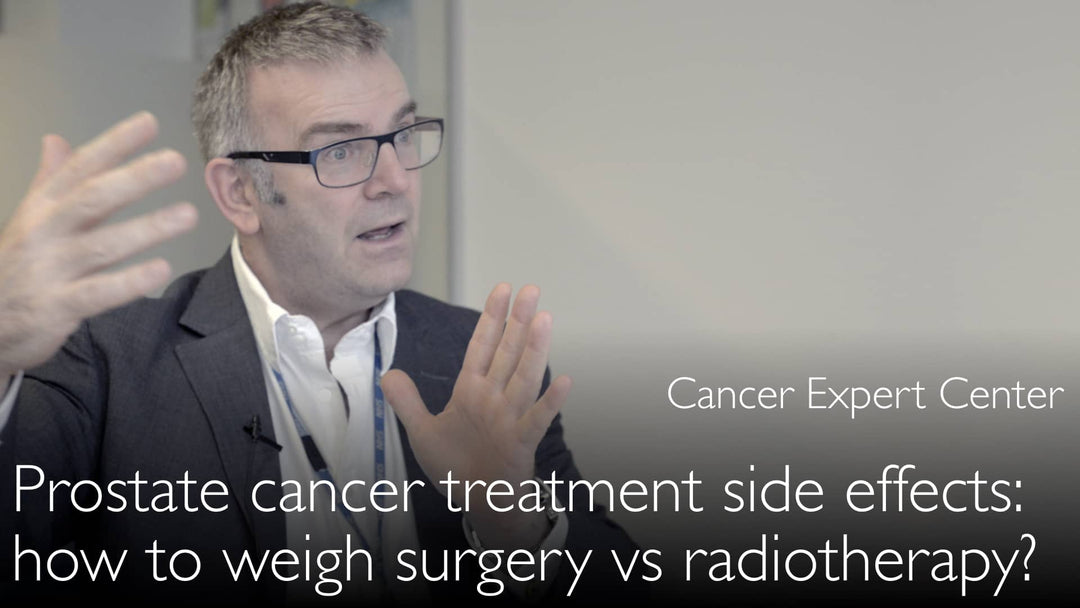Leading expert in prostate cancer treatment, Dr. Mark Emberton, MD, explains the critical differences in side effects between surgery and radiotherapy, including incontinence, sexual dysfunction, and bowel issues, and discusses how the lack of definitive comparative data makes patient choice highly dependent on personal priorities and practical logistics.
Prostate Cancer Treatment: Comparing Surgery vs. Radiotherapy Side Effects
Jump To Section
- Treatment Options Overview
- Lack of Comparative Data
- Surgery Side Effects
- Radiotherapy Side Effects
- Patient Priorities & Logistics
- Emotional Factors in Choice
- Future Data: PROTECT Study
Treatment Options Overview
Prostate cancer treatment primarily involves a choice between radical prostatectomy (surgery) and various forms of radiotherapy. Dr. Mark Emberton, MD, notes that this decision is complex and compares it to the challenge of choosing between surgery and radiotherapy for other conditions like acoustic neuroma. Both treatment pathways aim to cure localized prostate cancer but have profoundly different impacts on a patient's quality of life.
Lack of Comparative Data
A significant challenge for patients and doctors is the absence of robust comparative clinical trial data. Dr. Mark Emberton, MD, confirms that to date, no trial has directly compared surgery, radiotherapy, and active surveillance with long-term outcomes. The current assumption within the medical community is that these treatments work "relatively equally well" in terms of cancer control, but this has not been definitively proven by high-level evidence.
Surgery Side Effects
Prostate cancer surgery is a major operation and a significant life event. The most prominent side effect associated with a radical prostatectomy is urinary incontinence. As Dr. Mark Emberton, MD, explains, this is a major concern for many men considering this option. Both surgery and radiotherapy can lead to erectile dysfunction and other forms of sexual dysfunction, but the risk profile for urinary issues is distinctly higher with surgical intervention.
Radiotherapy Side Effects
Radiotherapy for prostate cancer carries its own unique set of challenges and side effects. A major practical consideration is the treatment schedule, which often requires attendance at a hospital for approximately 35 days over 6 to 7 weeks. While incontinence is not a typical side effect of radiation, it has a "greater propensity for affecting the way the rectum works." Dr. Emberton clarifies this is due to radiation-induced damage to the rectal mucosa, which can lead to bowel dysfunction.
Patient Priorities & Logistics
The choice of prostate cancer therapy is often driven by practical issues rather than clinical data alone. Dr. Mark Emberton, MD, emphasizes that a patient's proximity to a hospital offering radiotherapy is a huge factor, especially if they live far away. Furthermore, patients must personally prioritize which potential side effects—incontinence, sexual dysfunction, or bowel issues—they are most willing to risk. Decision aids are available to help men quantify these personal values.
Emotional Factors in Choice
Dr. Anton Titov, MD, and Dr. Mark Emberton, MD, discuss how treatment choice is frequently influenced by non-rational, emotional factors. Some patients have an inherent fear of radiation, perhaps due to a friend's negative experience. Others have a strong fear of general anesthesia and the concept of surgery itself. Dr. Mark Emberton, MD, notes that understanding these deep-seated fears is a crucial part of the consultation process.
Future Data: PROTECT Study
More definitive answers are on the horizon. Dr. Mark Emberton, MD, highlights the upcoming results from the UK-based PROTECT clinical trial. This study is designed to finally provide high-quality data on prostate cancer-specific survival, overall survival, and the long-term side effects of surgery, radiotherapy, and active surveillance. This evidence will be invaluable for helping future patients make a truly informed choice.
Full Transcript
Dr. Anton Titov, MD: Prostate cancer surgery and radiotherapy affect urinary function and sexual function differently. How do you choose the right prostate cancer therapy method? This might be a complicated question. How do you choose between surgery and several radiotherapy methods? It's a challenge similar to therapy of acoustic neuroma in neurosurgery. It's very challenging to compare benefits of surgery with radiotherapy.
Dr. Mark Emberton, MD: Yes. I think to date, there is no comparative prostate cancer clinical trial comparing surgery with radiotherapy with surveillance. Very soon we will have a clinical study in the public domain. It's a study from the UK, I am not directly involved in it. It's called PROTECT.
That will give us the results in terms of prostate cancer-specific survival and overall survival. The study will provide the side effects of each of the interventions over a long period of time. And so we will have data to help men choose between prostate cancer treatments.
At the moment I think the assumption is that all prostate cancer therapies work relatively equally well. But we don't have the data to prove that, that's the assumption. But prostate cancer treatment methods have very distinct side effects.
For radiation therapy you have to attend the hospital maybe for 35 days—that's 6 or 7 weeks. If you live 150 miles from your hospital, it's quite an ordeal. Surgery is a big operation. I mean, prostate cancer surgery is a very controlled operation. Surgery is a big life event.
Some people have very strong emotional predisposition towards or against either prostate cancer radiotherapy or prostate cancer surgery. So I did a clinic yesterday. I see patients who don't want surgery or radiotherapy. They come to see me. I'm always very interested to try and understand why they don't want a particular treatment.
Dr. Anton Titov, MD: And it's a non-rational sense. Some people just fear prostate cancer radiation. Maybe they had a friend that was harmed by radiotherapy. Some people fear going under anesthetic and having prostate cancer surgery.
Dr. Mark Emberton, MD: I think a lot of it is for reasons that we don't understand. Some of the reasons is a prioritization of the side effects. Incontinence is the big thing with prostate cancer surgery. Incontinence doesn't occur with prostate cancer radiotherapy.
Both surgery and prostate cancer radiotherapy affect sexual function. Radiotherapy has a greater propensity for affecting the way the rectum works. Because of the damage to the rectal mucosa from the radiation dose. So patients can see that.
There are many decision aids available in the public domain. They ask patients to value how they might feel afterwards to try and help them rate different prostate cancer therapy methods. But ultimately, the biggest driver of prostate cancer treatment method is who the patient sees first.
Dr. Anton Titov, MD: Do they see a surgeon first or radiotherapist first? That's what the data would suggest.
Dr. Mark Emberton, MD: And then, choice of prostate cancer therapy is driven principally by practical issues. Proximity to the hospital service. Also the prostate cancer therapy side effect profile affects which method patients prefer.







